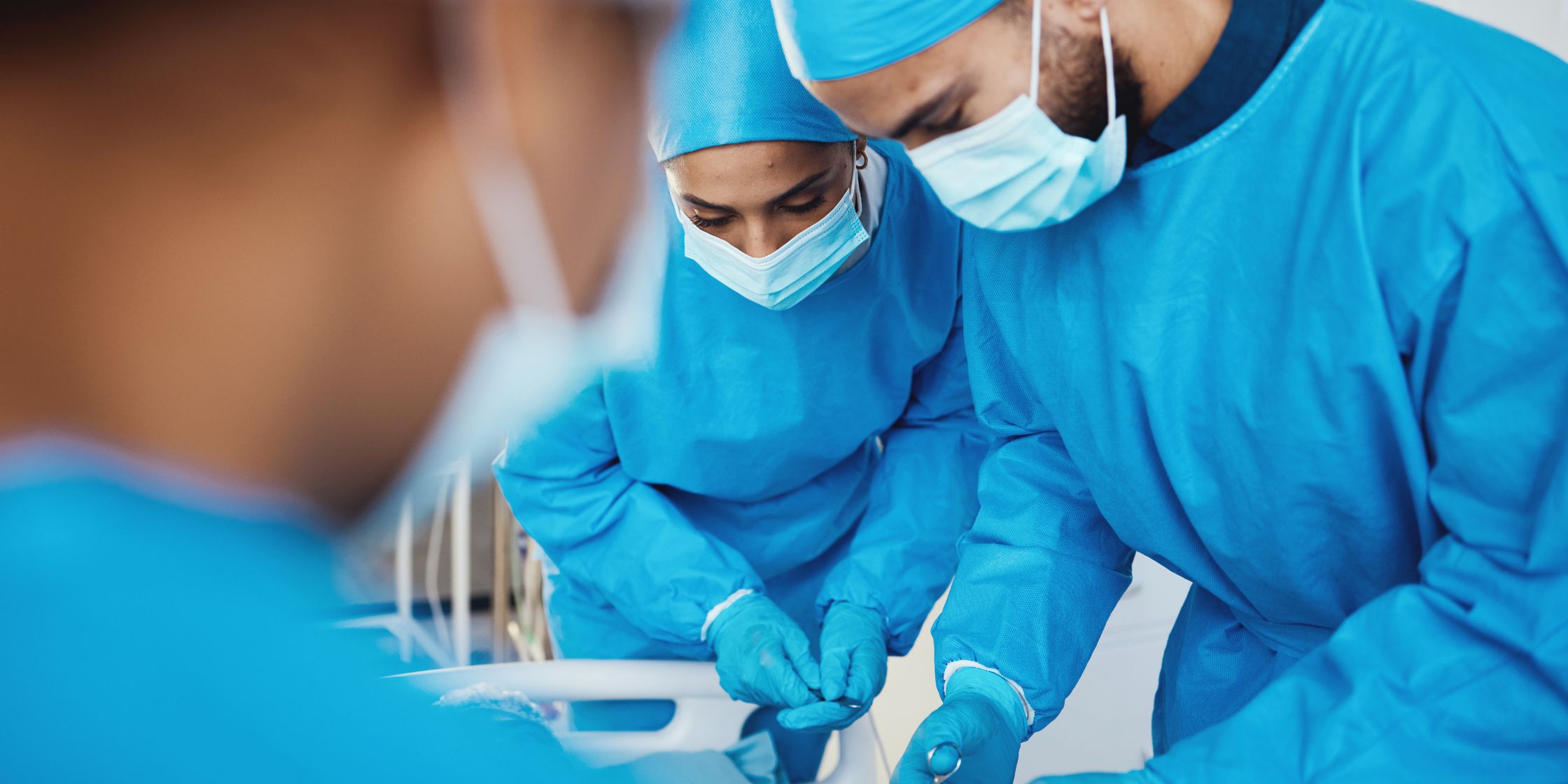Hernia repair surgery is a procedure to fix a hernia, which is a bulge in the abdominal wall. The surgeon will make an incision in the abdomen and push the bulged tissue back into place. They may also place a mesh over the weak area to strengthen it.

£ 4,200 starting price
Hernia Repair Surgery in the UK

£ 2,290 (All Inclusive)
Hernia Repair Surgery In Europe with KCM Clinic
Exploring Hernia Repair Techniques
The first step is visiting an orthopaedic surgeon who will recognise whether you need surgery or not. The surgeon will ascertain this by running a few tests and going through your past medical history. If you are experiencing the following hernia types, the doctor will not recommend surgery:
- Incarcerated Hernia: An incarcerated hernia is a serious condition in which the protruding tissue cannot be pushed back into the body. This can cause pain, swelling, and other complications. Incarcerated hernias often require emergency surgery.
- Reducible Hernia: A reducible hernia is a less serious condition in which the protruding tissue can be pushed back into the body. Reducible hernias can often be managed without surgery, but sometimes surgery may be recommended to prevent complications.
On the other hand, if your orthopaedic doctor is certain you need surgery, he or she will offer some guidelines for the pre-operation procedure. The next step is the surgical procedure:
The Comprehensive Process of Hernia Repair
Depending on the need, your surgeon will perform hernia repair surgery using either of these techniques:
- Open Hernia Repair Surgery: This is a traditional method that involves making a 3-6 cm incision in the abdomen. The surgeon then pushes the bulged tissue or loop of the bowel back into the abdomen and places a mesh over the weak area to strengthen it. The mesh is made of a flexible material that promotes the growth of new tissue to strengthen the weak area of the abdominal wall. The incision is then closed with stitches.
- Laparoscopic Hernia Repair Surgery: This is a minimally invasive procedure that involves making 3-4 small incisions in the abdomen. A thin tube containing a light source and camera is inserted through one of the incisions so that the surgeon can visualise inside the abdomen. Surgical instruments are inserted through the other incisions to perform the procedure. A piece of mesh is placed over the weak area of the abdominal wall to strengthen it.
Summary of a Hernia Repair Surgery
Prior to surgery, the patient will undergo a thorough medical evaluation. This includes a physical examination, medical history review, and, in some cases, imaging tests such as ultrasound or computed tomography (CT) scans to confirm the presence and type of hernia. The physical examination will focus on the area of the hernia, including the size, location, and any associated symptoms.
Preoperative Evaluation
Before the surgery, the patient undergoes a thorough medical evaluation. This includes a physical examination, medical history review, and sometimes imaging tests like ultrasound or CT scans to confirm the presence and type of hernia.
- Anaesthesia: Hernia repair surgery is typically performed under either general anaesthesia or local anaesthesia with sedation. The choice of anaesthesia depends on the patient’s health and the type of hernia.
- Mesh Placement: Mesh is frequently used in hernia repair surgeries to provide additional strength to the weakened abdominal wall. It can be made of various materials, including synthetic and biological options.
- Closure: After the hernia is repaired and the mesh is in place, the surgeon closes the incisions with sutures or staples.
Postoperative Care:
- Monitoring: Patients are closely monitored in a recovery area immediately after surgery. This includes monitoring their vital signs, such as their heart rate, blood pressure, and breathing.
- Pain Management: Pain management is crucial after hip replacement surgery. Patients are prescribed pain medication as needed to manage their pain.
- Range of Motion Exercises: Patients will be instructed to start range of motion exercises as soon as possible after surgery. This will help to prevent stiffness and improve their mobility.
- Physical Therapy: Physical therapy is an important part of the recovery process after hip replacement surgery. A physical therapist will help you learn how to walk, climb stairs, and perform other activities of daily living.
- Follow-up Appointments: Patients will need to have regular follow-up appointments with their surgeon to monitor their recovery.
- Risks and Complications: While hip replacement surgery is generally safe, there are potential risks and complications, such as infection, bleeding, dislocation of the hip, and nerve damage.
- Diet and Lifestyle: Patients may receive dietary and lifestyle recommendations to reduce the risk of future complications, such as avoiding heavy lifting and maintaining a healthy weight.
The Results of Hernia Repair Surgery Results
Both hip replacement procedures typically take about an hour. However, laparoscopic hip replacement surgery offers several advantages over open hip replacement surgery. It causes less pain, minimizes muscle damage, and allows for a faster recovery.
Hernia Repair Surgery in the UK: Key Statistics
In the United Kingdom, an estimated 100,000 hip replacement surgeries are conducted annually, showcasing the significant demand for this surgical procedure.
The overwhelming majority of these surgeries, accounting for a staggering 95%, take place within hospital settings, typically administered under the supervision of general anaesthesia. This ensures the utmost safety and comfort for patients undergoing this procedure.
Among the various types of hip replacement surgeries, total hip replacement stands out as the most prevalent, constituting approximately 80-85% of all cases. This highlights the prominence of total hip replacements and the need for effective treatment options.
When examining the age distribution of hip replacement patients, it becomes evident that the modal age group falls within the range of 61-70 years. This age bracket represents the highest concentration of individuals seeking hip replacement, emphasising the significance of addressing this condition among older adults.
Comparing Hernia Repair Costs in the UK
The cost of private hernia surgery in the UK typically ranges from £2,200 to £4,500. Here’s a comparison of hernia repair surgery prices in various regions of the UK:
- Manchester: £3,390 (Highest Cost) – £2,534 (Lowest Cost)
- Scotland: £3,590 (Highest Cost) – £2,998 (Lowest Cost)
- Southampton: £3,813 (Highest Cost) – £2,550 (Lowest Cost)
- Bristol: £3,305 (Highest Cost) – £2,550 (Lowest Cost)
- Wales: £3,500 (Highest Cost) – £2,900 (Lowest Cost)
- Birmingham: £4,406 (Highest Cost) – £2,564 (Lowest Cost)
- London: £3,870 (Highest Cost) – £2,617 (Lowest Cost)
- Norwich: £3,415 (Highest Cost) – £3,233 (Lowest Cost)
Please note that these prices are preliminary estimates for hernia surgery and can vary based on factors like the type of implant used, surgeon’s fees, hospital charges, and individual patient circumstances.
For those seeking cost-effective hernia surgery options, Poland, particularly KCM Clinic, is a viable choice. KCM Clinic is known for providing high-quality hernia treatments at a significantly lower cost compared to many Western countries. Their state-of-the-art facilities and experienced surgeons specializing in hernia repair make them a reputable choice for patients considering surgery.
Conclusion
Hernia repair surgery is typically an outpatient procedure, meaning you can go home the same day. You will need to rest and avoid strenuous activity for a few days. The risks of hernia repair surgery are low, but they can include infection, bleeding, and recurrence of the hernia.
FAQs
What Causes A Hernia?
A hernia occurs when an organ or tissue pushes through a weak spot or opening in the surrounding muscle or connective tissue. Common causes include heavy lifting, persistent coughing, obesity, and straining during bowel movements.
Can Hernia Recur After Surgery?
Yes, hernias can recur after surgery. While surgical repair is effective, it’s not always foolproof. Factors such as the type of hernia, surgical technique, and the patient’s overall health can influence the risk of recurrence.
Can A Hernia Go Away On Its Own?
No, hernias typically don’t resolve on their own. They usually require medical attention, either through surgery or other medical interventions, to correct the protrusion of tissue or organs.
Why Are Men More Susceptible To Hernias?
Men are more susceptible to hernias than women, primarily due to anatomical differences. In men, there is a natural weak point in the abdominal wall called the inguinal canal, which allows structures like the spermatic cord to pass through. This area is more prone to hernias, and activities that increase abdominal pressure, like heavy lifting, can contribute to hernia development in men.








